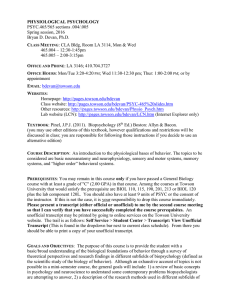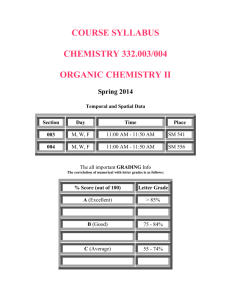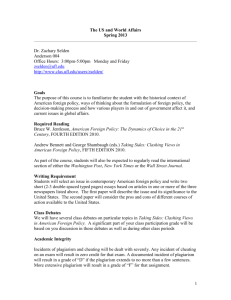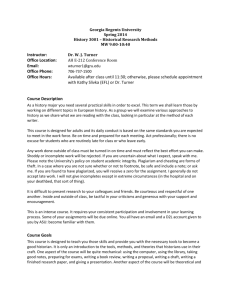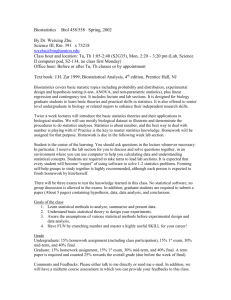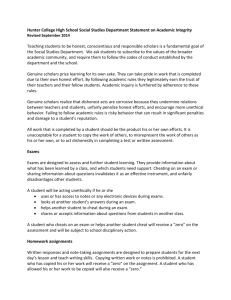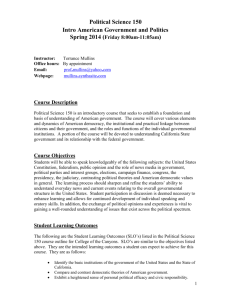PHYSIOLOGICAL PSYCHOLOGY - Towson University
advertisement
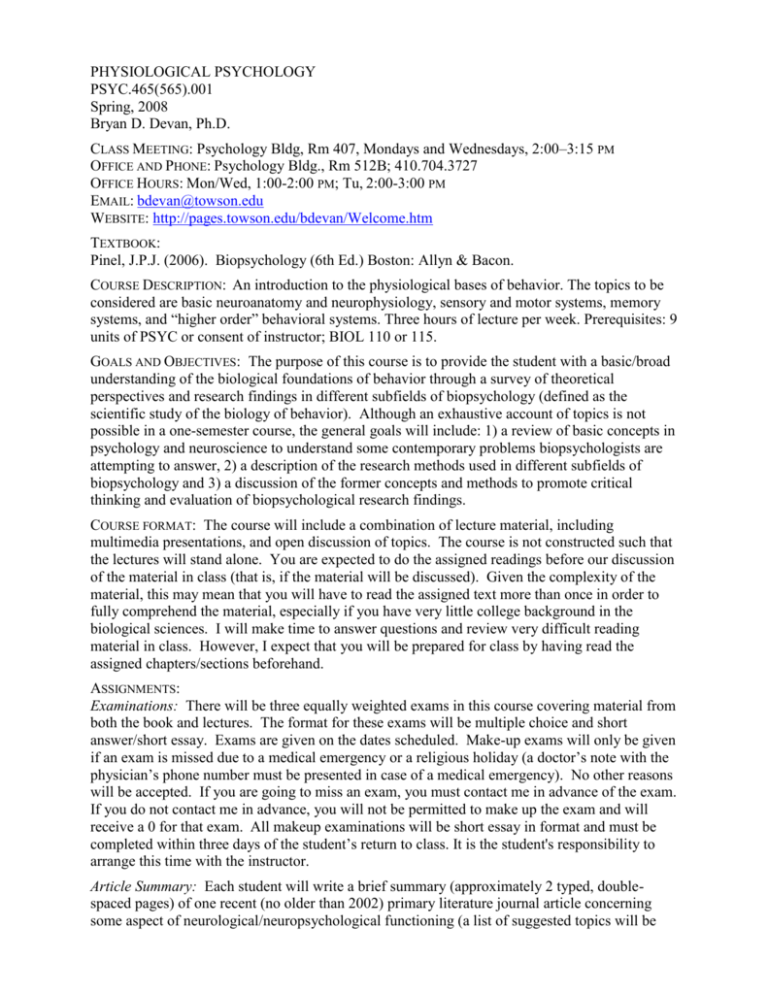
PHYSIOLOGICAL PSYCHOLOGY PSYC.465(565).001 Spring, 2008 Bryan D. Devan, Ph.D. CLASS MEETING: Psychology Bldg, Rm 407, Mondays and Wednesdays, 2:00–3:15 PM OFFICE AND PHONE: Psychology Bldg., Rm 512B; 410.704.3727 OFFICE HOURS: Mon/Wed, 1:00-2:00 PM; Tu, 2:00-3:00 PM EMAIL: bdevan@towson.edu WEBSITE: http://pages.towson.edu/bdevan/Welcome.htm TEXTBOOK: Pinel, J.P.J. (2006). Biopsychology (6th Ed.) Boston: Allyn & Bacon. COURSE DESCRIPTION: An introduction to the physiological bases of behavior. The topics to be considered are basic neuroanatomy and neurophysiology, sensory and motor systems, memory systems, and “higher order” behavioral systems. Three hours of lecture per week. Prerequisites: 9 units of PSYC or consent of instructor; BIOL 110 or 115. GOALS AND OBJECTIVES: The purpose of this course is to provide the student with a basic/broad understanding of the biological foundations of behavior through a survey of theoretical perspectives and research findings in different subfields of biopsychology (defined as the scientific study of the biology of behavior). Although an exhaustive account of topics is not possible in a one-semester course, the general goals will include: 1) a review of basic concepts in psychology and neuroscience to understand some contemporary problems biopsychologists are attempting to answer, 2) a description of the research methods used in different subfields of biopsychology and 3) a discussion of the former concepts and methods to promote critical thinking and evaluation of biopsychological research findings. COURSE FORMAT: The course will include a combination of lecture material, including multimedia presentations, and open discussion of topics. The course is not constructed such that the lectures will stand alone. You are expected to do the assigned readings before our discussion of the material in class (that is, if the material will be discussed). Given the complexity of the material, this may mean that you will have to read the assigned text more than once in order to fully comprehend the material, especially if you have very little college background in the biological sciences. I will make time to answer questions and review very difficult reading material in class. However, I expect that you will be prepared for class by having read the assigned chapters/sections beforehand. ASSIGNMENTS: Examinations: There will be three equally weighted exams in this course covering material from both the book and lectures. The format for these exams will be multiple choice and short answer/short essay. Exams are given on the dates scheduled. Make-up exams will only be given if an exam is missed due to a medical emergency or a religious holiday (a doctor’s note with the physician’s phone number must be presented in case of a medical emergency). No other reasons will be accepted. If you are going to miss an exam, you must contact me in advance of the exam. If you do not contact me in advance, you will not be permitted to make up the exam and will receive a 0 for that exam. All makeup examinations will be short essay in format and must be completed within three days of the student’s return to class. It is the student's responsibility to arrange this time with the instructor. Article Summary: Each student will write a brief summary (approximately 2 typed, doublespaced pages) of one recent (no older than 2002) primary literature journal article concerning some aspect of neurological/neuropsychological functioning (a list of suggested topics will be PSYC_465_001 2 provided). The summary should include a brief description of the study objectives, the basic methods used in the study, the basic results of the study, and conclusions. A copy of the journal article (including reference section) must be included with the summary. Presentation: Each student will give a 10-minute presentation on their chosen topic. The presentation should include (but is not limited to) a discussion of the article summary and other material/resources related to the topic. The presentation provides the student with an opportunity to further explore the chosen topic with less restriction on the source(s) of information used (e.g., websites, news reports etc.). Presentation resources must be academic and scholarly and include at least one journal publication. A sign-up sheet will be provided to select the time and date for your presentation. GRADING: Each of the three examinations will be worth 50 points. The written Article Summary will be worth a total of 30 points and will be graded on content, style, and format. Late written summaries are penalized 10% of the point value for each day the assignment is late (including Sat and Sun). The Presentation will be worth a total of 20 points and will be graded on a less formal basis than the written assignment, stressing the effectiveness of communicating the background, research design, results, general conclusions and your personal evaluation of the study/topic. Further information on the format of the Presentation will be discussed in class. If you are not prepared to give your presentation at the selected time and date, you will be penalized 50% of the point value with the remaining points/grade contingent upon whether there is time available to reschedule your presentation. The total number of points attainable in this course will be 200. The final grade will be determined by the total number of points accumulated from the summary paper, presentation and the three examinations. Several extra credit questions will be included on each examination. No other extra credit will be possible. Letter Grade Range Percentage Range Total Point Range A and A- 90-100% 180-200 B+, B, and B- 80-89% 160-179 C+ and C 70-79% 140-159 D+ and D 60-69% 120-139 Below 60% Below 120 F The plus (“+”, for grades falling in the upper 2% of a grade range, except that there is no “A+”) and minus (“-“, for grades falling in the lower 2% of a grade range, except that there is no “D-“ or “C-“) grades noted above will be given in the case of borderline performance. GRADUATE CREDIT: Students taking this course for graduate credit (PSYC.565) should see me immediately to arrange the extra assignment needed to receive graduate credit for the course. This assignment will be due no later than the last day of class. If the assignment is judged to reflect graduate level work, the student will receive the grade earned on the examinations, summary paper and summary presentation. If the assignment is judged not to reflect graduate level performance, the student will receive a grade one or more letters lower than that earned on the examinations, summary paper and summary presentation. PLAGIARISM AND CHEATING: Plagiarism and cheating will not be tolerated. There are several types of plagiarism. The most obvious variety occurs when an individual presents someone else’s ideas as his/her own. This plagiarism can be avoided simply by giving credit to the appropriate source. A second type occurs when credit has been given but the individual uses the same wording or nearly the same wording as the source. This also is plagiarism and can be PSYC_465_001 3 avoided by substantially recasting the idea in your own words. Looking at someone else’s paper during an exam or giving aid to someone else during an exam will be interpreted as cheating. The first instance of either plagiarism or cheating will result in an automatic zero for the examination or assignment in question. The second instance will result in and automatic failure of the course and possible suspension from the University. ATTENDANCE: Regular attendance is expected and is necessary for good performance. Attendance will be taken on a regular basis and will be considered in the case of a borderline grade. You are responsible for any material or information presented in class, whether you attend or not. I strongly recommend that you make arrangements with others in the class ahead of time to find out what you will miss if you cannot attend class. STUDENTS WITH DISABILITIES: If you need accommodation due to a disability, please make an appointment to see me, and bring a statement from Disability Support Services (4-2638) authorizing your accommodation. ACADEMIC STANDARDS COMMITTEE STATEMENT: This course may be repeated only once without the prior permission of the Academic Standards Committee. COURSE SCHEDULE (Subject to change as necessary) Week 1 2 3 4 5 6 7 8 9 10 11 12 13 14 15 16 Date Jan. 28, 30 Feb. 4, 6 Feb. 11, 13 Feb. 18, 20 Feb. 25, 27 Mar. 3, 5 Mar. 10 Mar. 12 Mar. 17, 19 Mar 24, 26 Mar. 31, Apr. 2 Apr. 7, 9 Apr. 14, 16 Apr. 21 Apr. 23 Apr. 28, 30 May 5, 7 May 12 May 16 Text Chapter (section) Ch 1 Ch 3 (3.1 – 3.3) Ch 3 (3.4 – 3.6) Ch 4 (4.1 – 4.4) Ch 4 (4.5 – 4.7); Ch 18 (18.1 – 18.2) Review Ch 5 Spring Break Ch 5, Ch 6 Ch 6, Ch 7 (7.1-.2) Ch 12 (12.1 – 12.4); Ch 13 (13.1 – 13.2) Review Ch 8 Ch 11 Ch 10 (10.3-.5); Ch 17 (17.1-.2) Review 12:30 – 2:30 pm Exams/Assignments Exam 1 Topics Due Exam 2 Article Summary Due Presentations Presentations Presentations Final Exam GENERAL INFORMATION: Please turn off cell phones and other electronic devices that emit audible sounds during class. This syllabus is subject to change at the discretion of the instructor.

